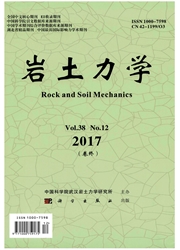

 中文摘要:
中文摘要:
天然沉积的土层总是表现出一定程度的强度各向异性,但现有的边坡稳定有限元分析极少考虑各向异性的影响。对大型有限元软件ABAQUS进行二次开发,使其能够考虑土体黏聚力随大主应力方向的变化,动态更新增量迭代求解过程中边坡不同位置处的抗剪强度,进而提出具备安全系数自动搜索功能的各向异性边坡稳定分析方法。计算结果表明,均匀边坡的有限元解与极限分析上限解相差很小。如果采用土体固结方向的黏聚力并按各向同性评价缓坡的稳定性,可能严重高估安全系数,尤其是在黏聚力较高的情况下。与极限分析不同,建立的强度更新有限元模型能够分析成层边坡的稳定性。
 英文摘要:
英文摘要:
Natural soil deposits always exhibit strength anisotropy in some degree, however, few slope stability analyses by finite element method have considered the effect of anisotropy until now. Here the variation of soil cohesion with direction of main principal stress was linked into the material library of commercial finite element package ABAQUS, and the shear strength on every integration point was updated dynamically in increment-iteration calculations. Furthermore, the finite element method for anisotropic slope was developed with searching automatically for the factor of stability. Based on numerical simulations performed, it is observed the finite element results are close to that from upper bound limit analyses for homogenous slopes. If soil anisotropy is omitted and the strength from triaxial compression tests is used to evaluate slope stability, it tends to overestimate the safety factors of gentle slopes, especially when the value of cohesion in vertical direction is great. Finite element model with updating strength owns advantage over limit analyses in studying layered slopes.
 同期刊论文项目
同期刊论文项目
 同项目期刊论文
同项目期刊论文
 期刊信息
期刊信息
